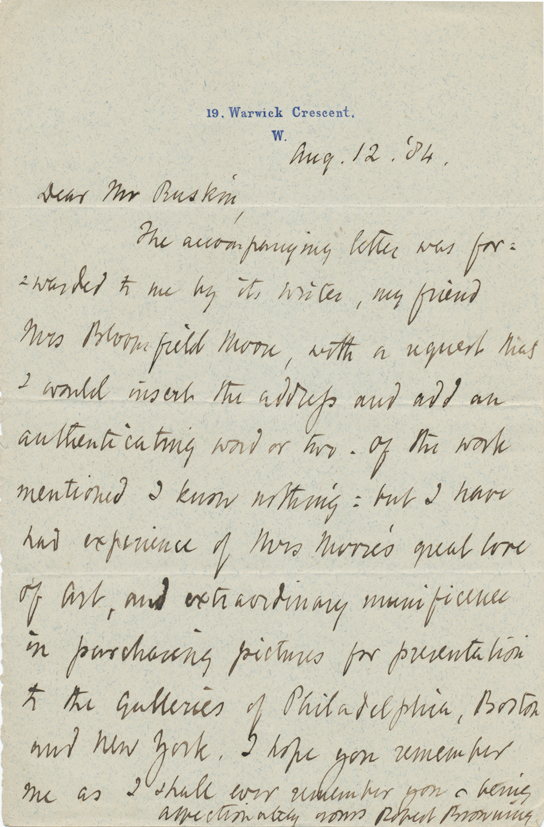Robert Barrett Browning
Robert Barrett Browning
Autograph Letter Signed to Art Critic John Ruskin - 1884
Autograph Letter Signed by the English poet Robert Browning, dated August 12, 1884, on his personal stationery; 4.5″ x 7″ (11.5cm x 17.8cm). Addressed to the great Victorian art critic John Ruskin, who 44 years earlier had written a scathing review of one of Browning’s earlier poetic works. In full:
Aug 12 1884
Dear Mr Ruskin,
The accompanying letter was forwarded to me by its writer, my friend Mrs. Bloomfield Moore, with a request that I would insert the addrefs (sic) and add an authenticating word or two. Of the work mentioned, I know nothing: but I have had experience of Mrs. Moore’s great love of art, and extraordinary munificence in purchasing pictures for presentation to the galleries of Philadelphia, Boston and New York. I hope you remember me as I shall ever remember you.
Being affectionately yours,
Robert Browning
Robert Browning’s Relationship with John Ruskin
In 1840 Browning published Sordello, a long narrative poem based on the murky history of the medieval Italian troubadour Sordello da Goito. The reviews were very harsh and it soon came to be known as the most incomprehensible poem of its time. It gained a reputation as “unintelligible” and “meaningless,” establishing Browning as an obscure poet. The critic John Ruskin said the poem was “…worse than the worst Alpine Glacier I ever crossed. Bright & deep enough truly, but so full of clefts that half the journey has to be made with ladder & hatchet.” Browning himself came to make light of the poem, saying it was “praised by the units, cursed by the tens, unmeddled with by the hundreds.” Ezra Pound began the process of reversing this legacy when he declared it “probably the greatest poem in English.” (Reference)
The extensive correspondence between John Ruskin and both Robert and Elizabeth Barrett Browning forms a fascinating exchange among three distinguished Victorian literary figures. As noted by University of Texas at Austin scholar, the late David deLaura, “The relationship was initiated by Ruskin, who praised Mrs. Browning profusely in his [critical] works of the 1850s. The feeling between Ruskin and Mrs. Browning was obviously intense, and drew from Ruskin an intimacy concerning himself disproportionate to their limited encounters. Robert, though he obviously kept in the background and seems rarely to have sought out Ruskin, was provoked by Ruskin at least three times to a spirited defense of his art, and after Mrs. Browning’s death in 1861 dealings between the two men continued to be rather frequent.”
This curious item appeared in The New York Times Saturday Review on August 19, 1899:
The interest in Robert Browning will not be diminished in the least by the fact that his heart was in the keeping for a long time of a fair Philadelphian, whose death occurred in London a few months ago. For years Mrs. Bloomfield Moore of that city was the poet’s most cherished idol. At one time the idea was rife that Mrs. Moore was engaged to be married to him. It is true that the deepest friendship existed between the poet and Mrs. Moore. That it did not result in marriage after the death of Elizabeth Barrett Browning was not due to Mr. Browning’s reluctance to take an American bride. One of Mr. Browning’s last works, “Ferishta’s Fancies,” shows that he was capable in the last years of his life of writing the most passionate love lyrics. To those who are able to read between the lines these lyrics, in the language of Mrs. Moore, suggested that the poet was not as well satisfied with Platonic love as was the author of “Agatha’s Friendship,” the novel that was published twenty-five years ago from Mrs. Moore’s pen. The nature of Mrs. Moore’s feelings for Browning was admirably expressed in one of her own poems, “On the Heights,” which was published a dozen years ago in London by the Remingtons. Mrs. Moore is the authority for this statement, which was originally made under her direction. © The New York Times
ROBERT BROWNING (1812-1889) was an English poet and playwright whose mastery of dramatic verse, especially dramatic monologues, made him one of the foremost Victorian poets. Browning’s poetry was known to the cognoscenti from fairly early on in his life, but he remained relatively obscure as a poet till his middle age. (In the middle of the century, Tennyson was much better known.) In Florence he worked on the poems that eventually comprised his two-volume Men and Women, for which he is now well known; in 1855, however, when these were published, they made little impact. It was only after his wife’s death, in 1861, when he returned to England and became part of the London literary scene, that his reputation started to take off.
JOHN RUSKIN (1819-1900) was the leading English art critic of the Victorian era, also an art patron, draughtsman, watercolorist, a prominent social thinker and philanthropist. He wrote on subjects ranging from geology to architecture, myth to ornithology, literature to education, and botany to political economy. His writing styles and literary forms were equally varied. Ruskin penned essays and treatises, poetry and lectures, travel guides and manuals, letters and even a fairy tale.
CLARA (JESSUP) MOORE (1824-1899) was a distinguished poet, novelist and philanthropist. In 1842 she married Bloomfield Haines Moore, a prominent Philadelphia businessman. Clara was Robert Browning’s closest friend and delivered the eulogy on the occasion of his death in December 1889.
All Vintage Memorabilia autographs are unconditionally guaranteed to be genuine. This guarantee applies to refund of the purchase price, and is without time limit to the original purchaser. A written and signed Guarantee to that effect accompanies each item we sell.

